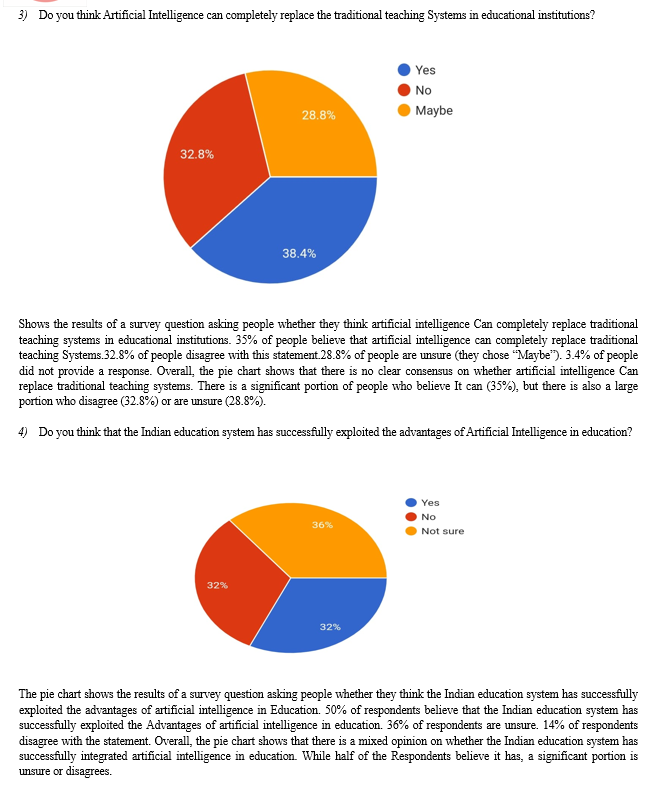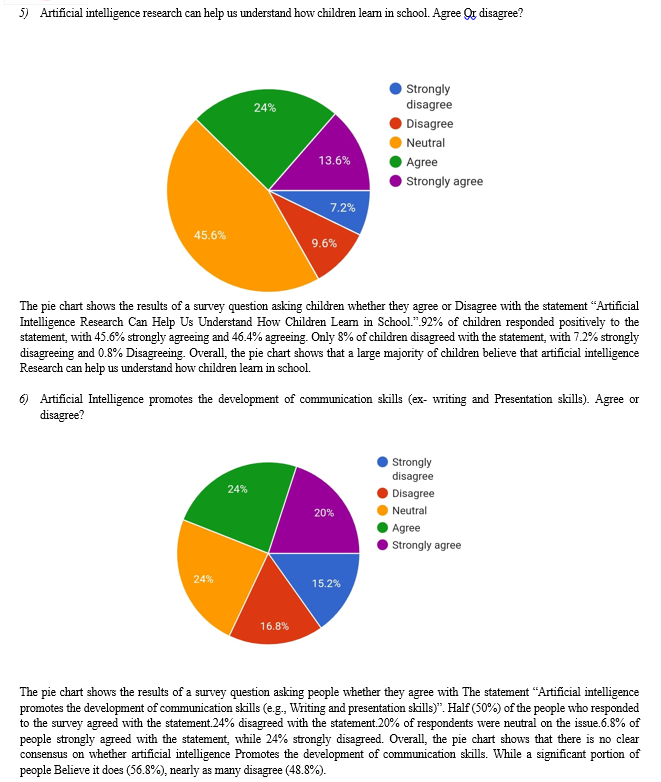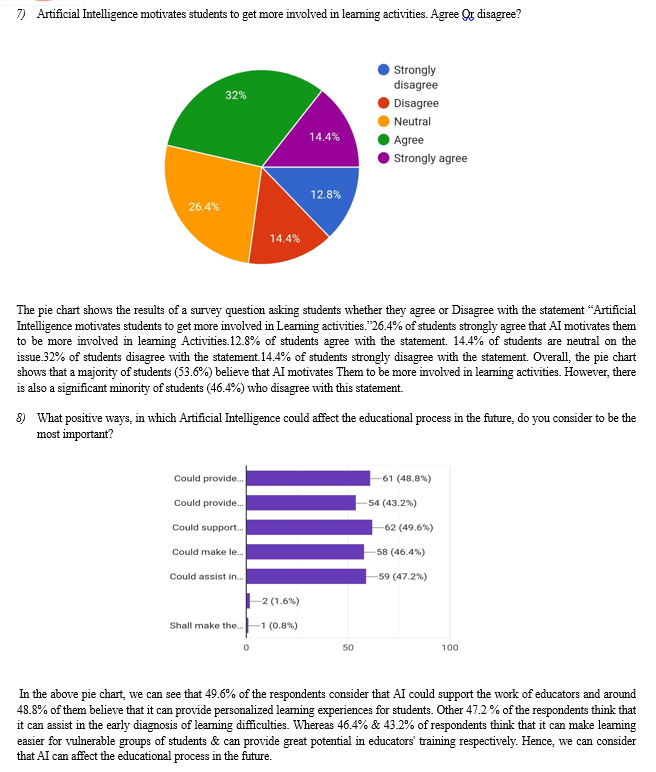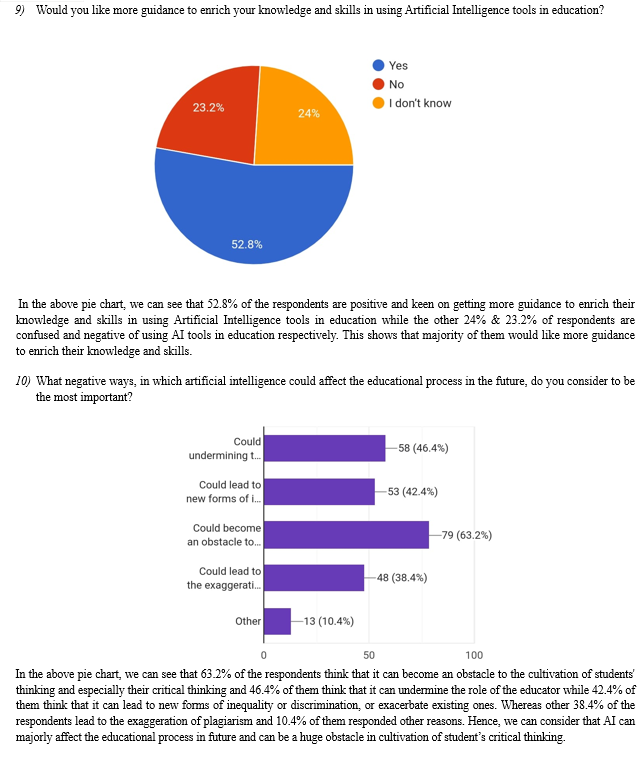Ijraset Journal For Research in Applied Science and Engineering Technology
- Home / Ijraset
- On This Page
- Abstract
- Introduction
- Conclusion
- References
- Copyright
Impact of Artificial Intelligence in Education Sector
Authors: Ms. Shilpa Sandhu , Runjhun Jain, Keshav Shah, Sakshath C Kumar, Sidhi Surana, Ayush Roy
DOI Link: https://doi.org/10.22214/ijraset.2024.59101
Certificate: View Certificate
Abstract
Building intelligent computers that can carry out tasks that traditionally require human intelligence is the goal of artificial intelligence (AI), a broad field of computer science. While there are many different approaches to AI, it is an interdisciplinary discipline, and recent developments in machine learning and deep learning in particular are causing a paradigm change in almost every area of the tech industry. Machines equipped with artificial intelligence are able to mimic or even outperform human brain functions. And as generative AI tools like ChatGPT and Google\'s Bard proliferate and self-driving car technology advances, AI is quickly becoming a part of daily life and a field that businesses in every sector are investing in.
Introduction
I. INTRODUCTION
There will be significant changes in the educational systems and procedures when artificial intelligence is used increasingly in education. Artificial intelligence could help teachers improve personalized education for their students. People who are disadvantaged, members of underserved groups, individuals with impairments, refugees, dropouts, and residents of remote areas can all benefit from access to suitable and improved learning opportunities thanks to artificial intelligence. According to recent findings, intelligent learning environments and artificial intelligence techniques can help deliver personally personalized approaches more effectively. Although active involvement from human teachers seems to be necessary for quality education, artificial intelligence envisions raising education and quality at all levels, notably. Today, many of the priorities for improving teaching and learning are not being met. Educators are looking for technology-driven solutions that address these priorities in a way that is safe, efficient, and scalable. Naturally, educators are wondering if the rapid pace of technology in their daily lives could help. Just as we all use AI-enabled services in our daily lives, educators are using AI enabled voice assistants in their homes, tools that can correct grammatical errors, complete sentences, write essays, and automate trip planning on their smartphones. Many educators are looking into AI tools as they become available to the public1.
Educators see ways to use AI-enabled capabilities such as speech recognition to improve support for students with disabilities, multi-lingual learners, and others who would benefit from greater adaptability and personalization of digital tools for learning. They’re looking into how AI could enable writing or improve lessons as well as their process for finding, selecting, and adapting material to use in their lessons.
Artificial Intelligence (AI) is revolutionizing the Indian education system in ways that hold immense promise for the future. With its diverse population and unique challenges, India is poised to benefit significantly from the integration of AI into its educational landscape. The multifaceted impact of AI on the Indian education system, touching on key areas such as personalized learning, accessibility, teacher support, language learning, skill development, and research and development.
A. Personalized Learning
One of the main benefits of artificial intelligence in education is its capacity to offer individualized learning opportunities. Systems with artificial intelligence (AI) may examine a large quantity of data on a particular student, including their learning preferences, skills, and weaknesses.
By using this data, AI algorithms may generate custom lesson plans, flexible tests, and content suggestions, guaranteeing that each student receives individualized education. By adjusting to each student's needs, AI improves student engagement, improves learning results, and promotes a more effective educational experience.
B. Intelligent Content Development
By producing customized learning materials, AI is changing content development. AI can provide interactive and interesting educational content by using machine learning algorithms and natural language processing. In this, creating quizzes, creating interactive simulations, and creating virtual reality experiences are all included. While providing students with immersive and dynamic learning experiences, AI-generated content assists educators in saving time.
C. Teacher Support
AI can play a significant role in supporting educators. By automating administrative tasks, such as grading and attendance tracking, teachers can free up more time for actual teaching and interacting with students. Additionally, AI can analyze student performance data, identify areas where students may be struggling, and suggest personalized teaching strategies or interventions. This can lead to more effective teaching practices and improved learning outcomes.
D. Language Learning
India is a linguistically diverse country with thousands of languages spoken. AI-powered language learning apps and platforms can help individuals learn multiple languages more efficiently. Whether it's regional languages or foreign languages, AI can offer interactive and tailored language learning experiences, making language acquisition more accessible to all.
E. Skill Development
AI-driven online courses and skill development programs have the potential to address the pressing issue of employability in India. As the job market evolves, acquiring new skills becomes essential. AI can identify skill gaps, recommend relevant courses, and offer assessments to measure skill proficiency. This empowers individuals to upskill and stay competitive in a rapidly changing job landscape.
F. Research and Development
AI is also transforming the research and development landscape in India. AI-powered data analysis tools can accelerate scientific research, medical diagnostics, and innovation in various fields. Researchers can leverage AI to process large datasets, identify patterns, and make groundbreaking discoveries, leading to advancements in science and technology
This research paper embarks on an extensive exploration of the multifaceted impact of AI in education. It delves into the transformative potential that AI holds for the education sector, highlighting current implementations, success stories, and the ethical considerations that underpin this technological advancement.
G. Transformative Potential of AI in Education
At the core of AI's transformative potential in education lies its capacity to process and analyze vast amounts of data swiftly and accurately. This ability forms the foundation for personalized learning, which represents a paradigm shift away from the one-size-fits-all approach of traditional education. Through AI algorithms, educational platforms can adapt to individual learner needs, providing tailored content, pacing, and support.
Intelligent tutoring systems, another hallmark of AI in education, offer personalized guidance and feedback, effectively complementing the role of human educators. AI's potential extends beyond mere content delivery; it can facilitate the development of critical thinking skills, creativity, and problem-solving abilities. As AI algorithms become increasingly sophisticated, they promise to make learning not only more personalized but also more engaging and effective.
H. Current Implementations and Case Studies
To assess the tangible impact of AI in education, it is essential to examine its current implementations and real-world case studies. Across the educational spectrum, from primary schools to higher education institutions, AI is being integrated into diverse aspects of learning and administration.
In K-12 education, AI-driven platforms are helping educators identify struggling students earlier, allowing for timely interventions. These platforms also offer personalized assignments and adaptive assessments, tailoring the learning journey for each student. In higher education, AI plays a pivotal role in the development of Massive Open Online Courses (MOOCs) that can reach learners worldwide while adapting to their individual progress.
I. Ethical Considerations and Challenges
While the promise of AI in education is immense, it is not without its ethical considerations and challenges. The collection and utilization of student data raises concerns about privacy, data security, and the potential for bias in algorithms. Ensuring that AI systems are transparent, unbiased, and equitable is paramount to prevent reinforcing existing educational disparities.
Moreover, the evolving role of educators in the AI-augmented classroom poses questions about the future of teaching as a profession. Striking the right balance between technology and human interaction is a complex challenge that requires thoughtful consideration.
II. QUESTIONS
- What are the ethical considerations and concerns surrounding the use of AI in education in India, particularly in terms of data privacy and bias?
Sol: Many factors make it crucial to address the ethical concerns surrounding AI in education: Defending dignity and human rights: Fundamental human rights and teachers' dignity may be impacted by the ethical concerns surrounding AI in education. As an illustration, An unaffected right to an education may be violated by bias and discrimination.
Right to privacy may be violated by privacy and data protection.
Thinkers' rights to autonomy and agency may be infringed.
Right to information may be violated by transparency and explainability
Suffrage rights may be violated by accountability and responsibility.
2. What role can AI play in addressing the digital divide in India's education system and ensuring access to quality education for all?
Sol: The power of AI and technology in education is demonstrated by India's comeback as the world's center of education. India is producing a generation of intelligent and talented people who are positioned to make major contributions to the world by utilizing AI-driven personalized learning, expanding access to high-quality education, empowering teachers, removing language obstacles, and encouraging inclusivity. In addition, AI is promoting innovation and research, developing skills, and making sure no student is left behind. A brighter future is being paved for not only India but the entire world as the country continues to embrace and incorporate AI and technology into its educational ecosystem. India is moving closer to regaining its rightful place as a worldwide hub for information and learning because to its innovative use of artificial intelligence and emphasis on education.
3. What are the challenges and barriers to implementing AI in education in India, and how can they be overcome?
Sol: Our lives are altering as a result of artificial intelligence (AI). We are gradually learning to apply the different applications of artificial intelligence to many facets of our lives, from writing aids to self-driving cars. Online learning is another area where AI has a lot of potential. Companies and organizations wishing to use artificial intelligence to upgrade their learning systems may encounter unforeseen difficulties. We will examine six implementation issues with AI in this essay and discuss solutions. Issues to consider: Inadequate or poor - quality data. AI systems work by being trained on a set of data that is pertinent to the problem at hand. However, businesses frequently struggle to "feed" their AI algorithms with the correct kind or quantity of data because they lack access to or it isn't currently available. When using your AI system, this imbalance may produce inconsistent or even discriminatory outcomes. You can avoid this problem, sometimes referred to as the bias problem, by making sure you use representative and high-quality data. Furthermore, it would be ideal to begin your exploration of AI with simpler algorithms that you can easily understand, account for bias, and adjust as necessary.
4. What are the long-term benefits of integrating Artificial Intelligence into the Indian education system?
Sol: Instructions tailored to the needs of each learner Students' motivation and involvement have improved. improved data analysis to acquire insights into student growth and performance
Platforms for adaptive learning that adjust the pace and content based on student ability
Efficient administrative processes, such as scheduling and grading Quick assistance is available through chatbots and virtual tutors.
Automated repetitious chores allow teachers to focus on teaching.
Higher immersive and interactive learning environments
Early identification of learning difficulties and quick intervention
Enhanced educational accessibility through online and remote study choices.
5. Is the Indian Education system technologically equipped to utilize Artificial Intelligence?
Sol: AI has been transforming the education system in India and other areas of the world, resulting in an educational revolution dubbed as Education 4.0. This transition has an impact on students, instructors, recruiters, and career counselors, substantially altering how they live and learn in the educational realm. Teachers, who have a lot of responsibilities, such as grading tests, creating progress reports, and doing a wide range of administrative chores, can also profit greatly from automation. Given that human teachers are not always available to address every student's problem in real-time and can't be everywhere at once, AI-backed automation technologies can help and supplement their subject-matter expertise, freeing up the teacher to concentrate on the more difficult and social parts of teaching. AI-powered tutoring programs provide pupils with flexible and interesting learning opportunities. These systems are able to assess student performance, spot problem areas, and offer personalized feedback and guidance. These resources can support classroom instruction, assist students who are having difficulties, and effectively track individual growth for teachers.
III. LITERATURE REVIEW: THE IMPACT OF ARTIFICIAL INTELLIGENCE ON EDUCATION
The rise of artificial intelligence (AI) and its impact on various sectors, mainly education, has been at the center of modern scientific debate. This literature review examines the integration of artificial intelligence into education, considering its infancy, changing characteristics and potential implications.
A. The birth of Artificial Intelligence in Education
- Early adaptation and motivation: The emergence of artificial intelligence in educational environments can be traced back to the emergence of computers and related technologies. As Moore (1985) described in his seminal article on the law of accelerating returns, the growth of computing power exploded the application of technologies, subsequently providing the environment for the development of artificial intelligence. The advent of personal computers marked a paradigm shift not only in technological capabilities but also in accessibility, creating an environment ripe for the adoption of AI in education.
B. Innovations in education based on artificial intelligence
- Exchange of Study Modules
The successes of artificial intelligence in education go beyond mere digitization. Online platforms and online educational projects such as MOOCs (Massive Open Online Courses) emphasize this change (Holland and Tirthali, 2014). These platforms, as noted by Johnson et al (2016), utilize artificial intelligence to personalize educational experiences, revolutionizing pedagogical approaches and expanding access. Robotics and Learning Drop:
In an era characterized by the rapid expansion of embedded systems, humanoid robots and chatbots have emerged as educational tools. Murphy et al (2017) investigated how humanoid robots function in two roles: assisting teachers and acting as independent tutors. These AI powered units not only increase the number of teachers but also provide students with a unique interactive learning interface.
C. Improving Educational Experiences with Artificial Intelligence
- Adjusted Teaching Quality: The main change in education fostered by AI is the hyper-personalization of content. As Baker and Siemens (2014) argue, the ability of artificial intelligence to adapt learning materials promotes an educational ecosystem that meets the individual needs of students and increases teacher effectiveness and teaching quality.
- Update the Learning Paradigm: Artificial intelligence has recalibrated the traditional student-teacher dynamic. Through tools that provide real-time feedback, AI not only assists teachers in course correction, but also empowers learners to be autonomous in their educational journey (Woolf, 2010).
D. Management revolutions through artificial intelligence
In addition to pedagogy, the impact of artificial intelligence on the administrative part of education is important. Automated systems powered by artificial intelligence simplify administrative tasks from planning to tracking student progress, thus optimizing the efficiency of educational institutions (Goldin et al., 2014).
E. The multifaceted impact of artificial intelligence
The extensive integration of AI into education highlights its potential to be both a disruptor and an enabler. While its advantages such as personalization and efficiency are praised, researchers such as Selwyn (2019) recommend a cautious approach and emphasize the importance of human supervision in the face of increasing mechanization.
IV. RESEARCH METHODOLOGY
Artificial Intelligence (AI) is having a profound impact on higher education across various aspects, including teaching, learning, administration, and research. Research in this area has highlighted both the opportunities and challenges AI brings to higher education.
Here are some key findings and trends in this field:
- Personalized Learning: AI-powered algorithms can analyze students' learning patterns, preferences, and strengths to deliver personalized learning experiences. This enhances student engagement and can lead to better learning outcomes.
- Improved Student Support: AI chatbots and virtual assistants can provide students with 24/7 support for questions, guidance, and information. This not only improves the student experience but also reduces administrative burden on faculty and staff.
- Data Analytics and Predictive Modeling: AI helps institutions analyze vast amounts of data to identify trends, predict student success or dropout risks, and make data-driven decisions. This can inform strategies for improving retention rates and academic advising.
- Enhanced Teaching: AI can assist instructors in designing and delivering courses. For instance, it can automate grading and provide insights into student performance, allowing instructors to focus on more personalized teaching and mentorship.
- Research and Discovery: AI aids researchers in processing and analyzing large datasets, making scientific discoveries, and accelerating the pace of research in various fields, such as medicine, natural sciences, and social sciences.
- Administrative Efficiency: AI-driven tools can streamline administrative tasks like admissions, enrollment, and financial aid processing. This leads to cost savings and improved operational efficiency.
- Language Translation and Accessibility: AI-powered translation tools can break down language barriers, making education more accessible to international students. Additionally, AI can assist in providing accessible content for students with disabilities.
- Ethical Concerns and Bias: There are concerns about bias in AI algorithms, which can perpetuate inequalities in education. Research is focusing on addressing these biases and ensuring that AI systems are ethically designed.
- Teacher and Staff Training: Educators and staff may require training to effectively use AI tools in their roles. Research is exploring effective ways to prepare the workforce for this technological shift.
- Costs and Implementation Challenges: While AI offers many benefits, there are initial costs associated with implementing AI systems in educational institutions. Research assesses the return on investment and strategies for cost-effective adoption.
- Cybersecurity: As educational institutions increasingly rely on AI and data-driven technologies, they become more susceptible to cybersecurity threats. Research explores ways to secure AI systems and protect sensitive data.
- Student Privacy: AI systems collect and analyze student data, raising concerns about privacy. Research investigates how to strike a balance between data-driven improvements and safeguarding student privacy.
- Regulatory and Ethical Frameworks: Research is ongoing to establish regulatory and ethical frameworks for AI in education to ensure that the technology is used responsibly and transparently.
- Virtual and Augmented Reality (VR/AR): AI-powered VR/AR technologies are transforming the way students learn by creating immersive educational experiences. Research has shown that these technologies can enhance understanding of complex concepts and improve retention.
- EdTech Startups and Innovation: The rise of AI has led to a proliferation of educational technology startups. Research examines the innovations emerging from these startups and their potential to disrupt traditional higher education models.
- Lifelong Learning and Upskilling: AI-driven online platforms and micro-credentialing are making it easier for individuals to engage in lifelong learning and upskilling. Research investigates the effectiveness of these programs and their impact on workforce … AI-Enhanced Campus Infrastructure: Research investigates how AI can improve campus infrastructure, such as optimizing energy consumption, improving transportation logistics, and enhancing security through smart surveillance systems.
- AI and Learning Analytics: Learning analytics, powered by AI, can provide insights into student engagement and performance. Research explores the effectiveness of using AI-driven analytics to inform pedagogical strategies.
- AI-Generated Content in MOOCs: Massive Open Online Courses (MOOCs) often rely on AI for generating and delivering content. Research assesses the scalability and quality of AI generated content in online education.
V. SURVEY RESULTS
The following set of charts are the survey results that was conducted by the team to gain insights on the impact of AI on the general public.





V. OVERALL FINDINGS OF THE SURVEY
- AI's impact on education: According to the majority of respondents, AI has a major influence on education, demonstrating the importance of this technology in the field of education.
- Dependency on AI: A sizable percentage of participants stated they used AI every day, demonstrating an increased reliance on these technologies for a range of purposes.
- Replacement of Traditional Teaching: Opinions on whether AI can fully replace traditional teaching systems are mixed, with some believing it can, some disagreeing, and still others not convinced. There is no clear consensus on this issue.
- AI's exploitation in the Indian educational system: Opinions on the effective integration of AI in the Indian educational system are divided; some think it has worked well, while others aren't sure or disagree.
- Role of AI in Understanding Learning: Most kids think that research on AI can help us understand how kids learn in school.
- Impact on Communication Skills: Opinions on whether AI fosters the improvement of communication skills are mixed, with a sizable percentage of respondents holding both agreeing and disapproving positions.
- Motivation for Learning Activities: Although the majority of students think that AI encourages them to participate more in class, a sizeable minority of students don't agree.
- Positive Effects of AI on Education: According to respondents, there are a number of ways that AI might improve education in the future. These include helping to diagnose learning disabilities early on, aiding instructors, and offering individualized learning experiences.
- Interest in Additional direction for AI Tools in Education: Most respondents expressed a need for additional direction to improve their understanding of and proficiency with the use of AI tools in education.
- Negative Effects of AI on Education: Respondents voiced worries about the negative effects of AI on education, including how it can impair critical thinking, diminish the importance of teachers, and exacerbate prejudice or inequality.
In general, the results show that while AI has great promise for education, there are reservations about how it will be applied and how it will affect both conventional teaching strategies and student learning objectives. It is evident that there is a need for further research and direction on how to integrate AI technologies into the classroom while simultaneously addressing any possible obstacles or negative effects.
Conclusion
The survey\'s outcomes show that artificial intelligence (AI) has a big influence on education, both in terms of perception and real-world applications. First off, a sizable fraction of respondents relies on AI for daily chores, and the vast majority of respondents think that AI has a substantial influence on education. On the other hand, opinions differ over whether AI can fully replace conventional teaching techniques or if the Indian educational system is taking use of AI\'s benefits. Positively, respondents acknowledge that AI has the ability to help teachers, offer individualized learning experiences, and enable the early detection of learning disabilities. Respondents are also open to receiving further direction on how to use AI technologies in the classroom. On the other hand, there are worries about the detrimental effects of AI on education. Most people worry that AI would worsen inequality, impair critical thinking abilities, and diminish the need of education. Concerns have also been raised regarding AI\'s propensity to encourage plagiarism. Overall, the results point to a complicated environment where artificial intelligence (AI) is both welcomed for its potential to improve education and viewed with skepticism because of its alleged drawbacks. This implies that careful consideration must go into integrating AI into teaching methods in order to optimize its advantages and minimize any potential drawbacks. To properly negotiate the changing link between AI and education, more research and advice are clearly needed.
References
[1] https://www.sciencedirect.com/science/article/pii/S2666920X21000199 [2] https://www.researchgate.net/publication/351082272_Role_of_Artificial_Intelligence_in_Education [3] https://onlinedegrees.sandiego.edu/artificial-intelligence-education/ [4] https://www.indiatoday.in/amp/education-today/featurephilia/story/ai-game-changer-education-sector-2477394-2023-12-18 [5] https://keymakr.com/blog/how-ai-is-impacting-on-the-education-system/amp/ [6] https://bestcolleges.indiatoday.in/news-detail/ais-role-in-reshaping-indian-education [7] https://timesofindia.indiatimes.com/blogs/voices/how-ai-can-revolutionise-education-in-india/ [8] https://indiaai.gov.in/article/ai-impact-on-india-ai-in-education-is-changing-india-s-learning-landscape [9] https://www.clearias.com/ai-in-education/ [10] https://www.researchgate.net/publication/344739714_AI_Intervention_in_Education_Systems_of_India_An_Analysis
Copyright
Copyright © 2024 Ms. Shilpa Sandhu , Runjhun Jain, Keshav Shah, Sakshath C Kumar, Sidhi Surana, Ayush Roy. This is an open access article distributed under the Creative Commons Attribution License, which permits unrestricted use, distribution, and reproduction in any medium, provided the original work is properly cited.

Download Paper
Paper Id : IJRASET59101
Publish Date : 2024-03-18
ISSN : 2321-9653
Publisher Name : IJRASET
DOI Link : Click Here
 Submit Paper Online
Submit Paper Online

